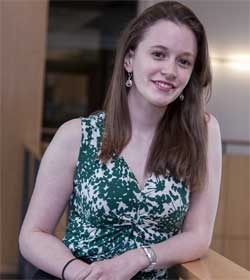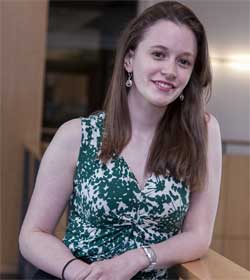 KINGSTON, R.I. – April 16, 2013 – Eily Cournoyer had a tumor removed from her brain when she was a little girl. Thankfully, it was benign but the frightening experience changed her life.
KINGSTON, R.I. – April 16, 2013 – Eily Cournoyer had a tumor removed from her brain when she was a little girl. Thankfully, it was benign but the frightening experience changed her life.
She was so grateful to the doctors who saved her she decided to devote herself to the medical field. Now the 21-year-old senior at the University of Rhode Island is one step closer to her dream.
The Portsmouth, R.I., resident has received a Fulbright grant to study cancer at the graduate level in England for a year. What makes the grant even more special is that the United Kingdom is the most competitive Fulbright student program of all: only about 6 percent of applicants receive funding.
“I’m so happy,” says Cournoyer. “I still can’t believe it. I never imagined that I would get such a prestigious honor.”
The Fulbright, along with a Whitaker International Program Fellowship grant Cournoyer also won, covers tuition at the Cancer Institute at University College London, as well as room-and-board and living expenses. The grants also pay for her travel costs.
Cournoyer plans to work closely with Mark Lowdell, director of cellular therapeutics at Royal Free Hospital and a senior lecturer in hematology at University College London. They will focus on how to improve hematopoietic stem cell transplants for blood cancers, such as leukemia.
“This is a great opportunity to learn at an internationally-renowned institution,” says Cournoyer. “The knowledge I’ll get will be crucial in my development as a doctor-scientist and future global leader in the fight against cancer.”
Cournoyer was only eight years old when she started getting headaches and dizzy spells. The pain from the headaches was so bad the third-grader would lean her head against a wall at recess for relief.
“I used to get sick constantly,” she says. “I couldn’t walk in a straight line.”
After six months of unexplained distress, Cournoyer got the shocking diagnosis: a benign pediatric brain tumor. Although the tumor was not cancerous, doctors told her parents that the growth and progression of the tumor was so serious she would die in a month if it weren’t removed.
She had surgery three days later. “I remember waking up and feeling like I had a turtle shell on my head,” she says.
It took her a year to recover. No running. No sports. She remembers spending her days at home coloring. Around this time, she thought about becoming a doctor and was hooked after taking an anatomy class in middle school. “I remember we learned about the heart,” she says. “I thought it was completely fascinating.”
After attending Bishop Stang, a Catholic high school in North Dartmouth, Mass., she chose URI, lured by the outstanding engineering programs, small classrooms, and personal attention from professors. “I would have been lost at sea at a bigger school,” she says.
A chemical engineering and biology major, Cournoyer has excelled during her four years at URI. She received the University College Scholar Award in 2010 as one of the top 10 students in the freshman class. She won a Goldwater Scholarship as a college sophomore – a highly selective national award – for her potential as a researcher, and she was a national finalist for the Marshall Scholarship in the fall.
“Eily’s accomplishments are evidence that the opportunities available to the University’s top students are truly world-class,” says Kathleen Maher, assistant director of the URI Honors Program, who also serves as adviser for the Fulbright Program. “The Honors Program encourages and supports students in their pursuit of excellence.”
Cournoyer is especially proud of her collaboration with Geoffrey Bothun, associate professor of chemical engineering at URI. The two conducted bio-nanotechnology research on the interactions between fullerenes – spherical molecules made up entirely of carbon – and model cell membranes, as well as research on cationic lipid coated magnetic nanoparticles for siRNA delivery as a possible treatment for cancer.
“Eily is an exceptional person and working with her over the last few years has been one of the most enjoyable and rewarding experiences I’ve had at URI,” says Bothun. “Although it will be difficult to see her go in June, I am very excited for what’s in store for her in the future.”
A summer internship in 2012 at St. Jude Children’s Research Hospital in Memphis, Tenn., also influenced Cournoyer, one of only 69 selected from a pool of more than 700, which included medical students and doctoral candidates from across the nation. She researched methods to treat neuroblastoma, a cancerous tumor that develops from sympathetic nerve tissue in infants and young children.
A paper on her research won a hospital award, but it was the sick children she met during her walks around the hospital that left a lasting impression and made her even more determined to become a doctor and researcher.
“A lot of the children didn’t have hair,” she says. “Some of them were walking with IV bags behind them. Some were shy; some were the friendliest people you’d ever meet. It was sad, but it made me realize that my work is worthwhile and could help people.”
After a year in England, she hopes to return to the Boston area for medical school. Her goal is to be a pediatric oncologist who not only treats young patients, but also works in the lab researching ways to fight cancer.
“Cancer is a devastating illness that pretty much touches everyone, but I feel drawn to pediatrics,” she says. “There are a lot of kids who won’t get an opportunity to live because of cancer. I’d like to devote my time to them. I’d like to help them grow up.”
She’ll never forget what a doctor told her about a father whose infant had cancer: One day, I just want to play catch with my son.
Pictured above: Eily Cournoyer, a 2013 graduate of the University of Rhode Island who received a Fulbright grant and a Whitaker International Fellowship Program grant to do cancer research in England next year.
The Fulbright Program is an international educational exchange program sponsored by the U.S. government and is designed to increase understanding between the people of the United States and the people of other countries. The main source of funding for the Fulbright Program is an annual appropriation from the U.S. Congress to the U.S. Department of State, Bureau of Educational and Cultural Affairs. Recipients of Fulbright grants are selected on the basis of academic or professional achievement, as well as demonstrated leadership potential in their fields. The Program operates in more than 155 countries worldwide.
The Whitaker International Fellows and Scholars Program supports emerging leaders in U.S. biomedical engineering to study, pursue an internship, or do research overseas that will help their careers. The program awards 50 to 60 grants every year.
This award is among eight coveted national scholarships won by URI students this year. They were awarded two Fulbright Scholarships, three NOAA/Hollings Scholarships, a Whitaker Scholarship, a Truman Scholarship, and a Boren Scholarship.
Photo by Michael Salerno Photography

